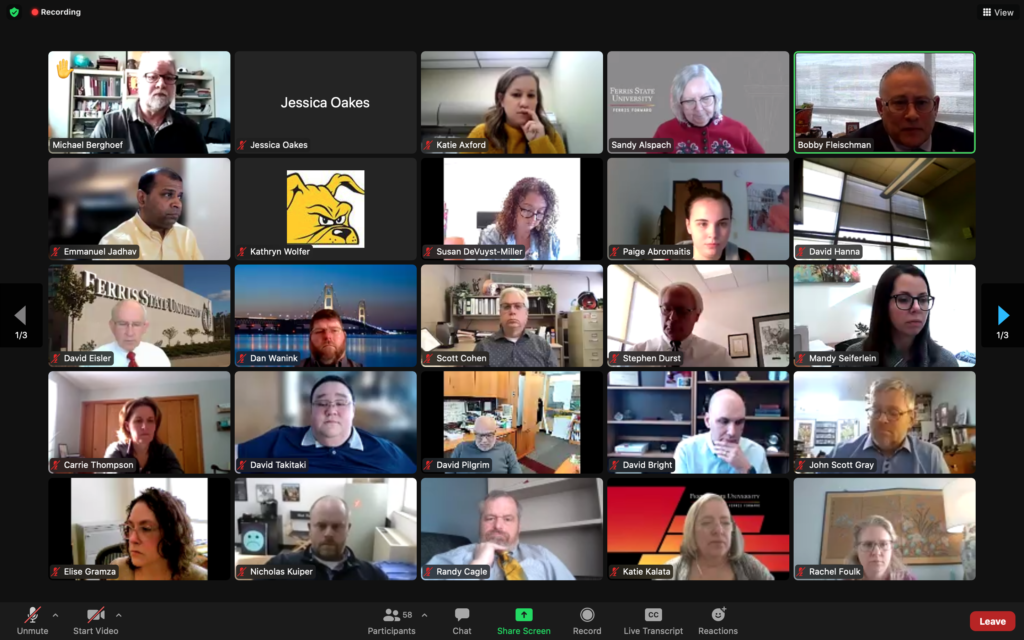
The Academic Senate voted on and approved three proposals in a collaborative meeting on Tuesday, Feb. 1.
With 32 senators in attendance, the virtual meeting’s “new business” covered recommended changes to pre-pharmacy admission requirements, certificate policy revision and general education sub-committees.
“This kind of activity doesn’t happen without mutual respect and mutual trust,” Senate President Sandra Alspach said as the meeting began. “Our Academic Senate processes are built on a foundation of shared governance.”
The pre-pharmacy program update was first in line for senate action. As summarized by University Curriculum Committee chairman Rusty Leonard, this update was proposed by Colleen Partigianoni and David Frank of the physical science department.
“We came up with something that basically serves as a blueprint for students that want to enter the Ferris College of Pharmacy,” Frank said.
With recent changes in the pre-pharmacy program’s admissions requirements, Patigianoni and Frank believed some previously required courses were no longer necessary.
“They need to align the pre-pharm program with those new standards. There are some courses that have been deleted, but there’s no new courses that are coming through,” Leonard said.
The proposal did not pass without discourse. Senator Scott Heron from the biological sciences department raised concerns about how the changes in pre-pharmacy would affect students in the Tuition Incentive Program.
“There was significant concerns with the [Registrar, Academic Affairs and MyDegree] committee about some of the changes and the implications of the changes,” Heron said. “Such as the credit load expectation moving from a three-year to a two-year program, the impacts on TIP students and the disproportionate impact that that was having on students that are financially disadvantaged.”
The Pre-Pharmacy Update Proposal passed with a vote of 59% in support, 16% not supporting and 24% abstaining.
Leonard and Frank both responded to various concerns from academic senators, ensuring the group that students in pre-pharmacy would have access to other sources of financial aid.
“This is a majority, so I’ll call it support,” Alspach said after the first vote. “But you notice that we have an array of opinions about this one. I think that discussion is healthy.”
Next, Leonard presented a policy revision proposal, which aims to place a maximum of 18 credit hours on an academic certificate in the UCC manual.
Political science professor David Takitaki asked his fellow senators if the proposal should explicitly state that exceptions to this rule may be considered for analysis approval. When no senator spoke up to second this notion, it was dropped.
“Writing the language into every policy that you can appeal for an exception seems to me to violate the nature of what a policy is,” Alspach said.
The policy revision proposal passed as written with a “technical majority” of 53%.
The third and final proposal was presented by General Education Director Victor Piercey and prompted limited discussion.
“The goal is to make sure that the College of Education and Human Services has an adequate opportunity for representation on subcommittees,” Piercey said.
In Piercey’s “TLDR,” he explains that this representation would be achieved by placing at large members of CASE on each department’s subcommittee.
Alspach described this proposal as a desire for balanced voices.
“You’ve got the experts in the field at the table, but they are not the only voices being heard. Other voices are being heard as well,” Alspach said.
The general education subcommittee’s proposal passed with 81% approval.
After Senate approval, these recommendations are moved from Academic Affairs to the President’s Council and then they go to the Legal General Council. If approval continues, the recommendations are subject to public review for 30 days.
The meeting concluded with announcements on behalf of the administration and Student Government, beginning with President David Eisler.
“Always a pleasure to be with the Academic Senate, and I really appreciate the care that you take in your deliberations,” Eisler said.
In his announcement, Eisler discussed a “disappointing” lack of higher education proposals at Gov. Whitmer’s 2022 State of the State address.
He then encouraged the academic senators to attend the upcoming Legislative Day event in Lansing, as well as this year’s Festival of the Arts.
Student Government President Paige Abromaitis addressed the senate with plans for the 2022 Big Event. It will take place on April 9, from 1 p.m. to 3 p.m.
Abromaitis enjoys attending Academic Senate meetings on behalf of Student Government.
“[At] times there’s heated discussion and other times [there] isn’t. But it’s really great to know that we have this senate because, you know, the professors want what’s best for us,” Abromaitis said.
The Academic Senate will continue their collaboration and deliberations via Zoom on March 1.
